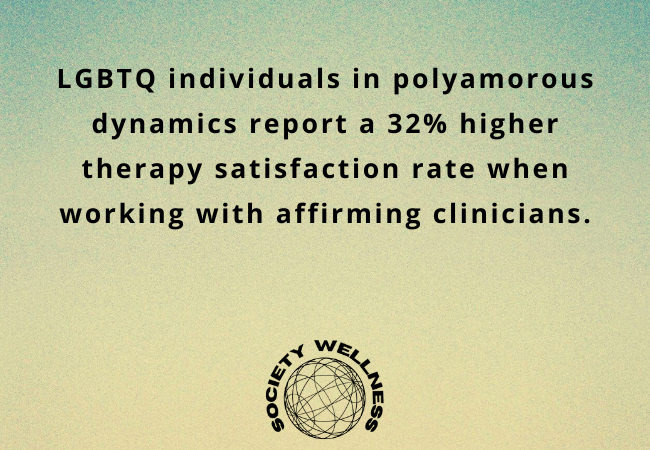When most people think of couples counseling, they often envision a monogamous partnership. But for many LGBTQ individuals and communities, love doesn’t always follow traditional norms — and that’s not only okay, it’s beautiful. From open relationships to relationship anarchy to polyamorous constellations, the ways we love are vast and valid.
So the question becomes: does LGBTQ couples counseling work for polyamorous relationships?
The answer is a resounding yes — when it’s affirming, informed, and queer-competent. At LGBTQ Behavioral Health Center Massachusetts, we provide queer affirmative therapy Massachusetts that honors diverse relationship structures and dynamics, offering tools to help every partner feel seen, heard, and valued.
This guide will walk you through how LGBTQ couples therapy Massachusetts supports polyamorous relationships, what to expect from therapy, and how to find a therapist who affirms non-monogamy as much as they affirm your LGBTQ identity.
Understanding Polyamory in LGBTQ Relationships
Polyamory — or consensual non-monogamy (CNM) — is the practice of having multiple romantic or sexual relationships simultaneously, with the consent of all involved.
Within LGBTQ communities, polyamory is often embraced as a way to challenge traditional norms around love, ownership, and emotional expression. Some LGBTQ people find that polyamory:
- Aligns with their gender or sexual identity
- Provides a structure to explore emotional and sexual freedom
- Supports healing from heteronormative relationship pressures
- Encourages radical honesty, autonomy, and consent
But polyamorous relationships, like any others, can face conflict, communication breakdowns, boundary issues, and emotional fatigue — especially without support.
That’s where LGBTQ couples counseling Massachusetts becomes invaluable.
Does LGBTQ Couples Therapy Massachusetts Support Polyamorous Relationships?
Absolutely — when the therapy is queer-affirming and non-monogamy-affirming.
At LGBTQ Behavioral Health Center Massachusetts, our therapists:
- Understand polyamory, relationship anarchy, and open dynamics
- Offer communication tools for multi-partner relationships
- Help with boundary setting, agreements, and trust
- Provide space for each partner to express needs without judgment
- Avoid pathologizing non-monogamy or pushing monogamous norms
This form of therapy is often referred to as queer affirmative counselling Massachusetts — therapy that sees your relationship structure as valid and workable, not as something to be fixed.
Common Challenges Polyamorous Couples Bring to Therapy
Whether you’re new to polyamory or have been navigating CNM for years, therapy can support you in handling issues such as:
1. Communication Across Multiple Partners
- Difficulty maintaining transparency
- Navigating time management and emotional bandwidth
- Feeling heard and prioritized without creating hierarchies
2. Jealousy and Insecurity
- Emotional reactions around other relationships
- Comparison dynamics
- Building self-worth in the face of complex feelings
3. Boundaries and Agreements
- Establishing rules that feel good for all partners
- Reassessing agreements as needs evolve
- Negotiating limits around intimacy, disclosure, or time
4. Metamour Relationships
- Tensions between partners who share a partner
- Need for respect and healthy boundaries without forced closeness
- Navigating co-parenting or cohabiting as part of a polycule
5. Crisis Management
- Relationship ruptures due to broken agreements
- Emotional burnout or mental health concerns
- Shifting relationship structures after a breakup or major change
LGBTQ therapy Massachusetts provides a structure for working through these challenges while affirming everyone’s identity and relational values.

What Does LGBTQ-Affirming Polyamorous Couples Therapy Look Like?
Normalizes Your Relationship Structure
There’s no need to explain or justify your non-monogamy. Therapists already understand polyamory and treat it as just one of many valid relationship models.
Encourages Consent-Based, Evolving Agreements
Rather than relying on rigid rules, therapy supports fluid agreements that center respect, trust, and communication.
Supports Individual and Collective Needs
A therapist will help explore each person’s emotional reality while finding collective goals that foster group harmony.
Avoids Hierarchical Bias
Whether your polyamory is hierarchical or non-hierarchical, your therapist won’t prioritize certain roles (e.g., “primary”) unless you do.
Integrates Mental Health and Relational Support
Polyamorous partnerships can intersect with anxiety, trauma, depression, or neurodivergence. Our center offers both individual and couples therapy, including structured programs like:
- LGBTQ Intensive Outpatient Program Massachusetts (IOP)
- LGBTQ Partial Hospitalization Program Massachusetts (PHP)
These programs provide extra support when relationship challenges overlap with mental health needs.
How Therapy Can Support Different Polyamorous Configurations
Polyamory is not a one-size-fits-all experience. Our therapists support configurations such as:
- Dyads with external partners (e.g., one or both partners have other relationships)
- Triads or quads navigating shared relationships
- Solo polyamory where each person maintains autonomy
- Metamour relationships for partners of partners
- Polycule dynamics involving extended chosen family networks
Whether you’re working through primary/secondary agreements or exploring parallel polyamory, therapy can help clarify intentions, support emotional regulation, and maintain mutual respect.
What to Expect in Your First Session
Your therapist will guide a conversation that may include:
- How your relationship structure works (or doesn’t)
- What each person wants from therapy
- Identifying core challenges (e.g., time, trust, triggers)
- Reviewing past agreements and communication patterns
- Discussing mental health, identity, and intersectionality
You’ll leave your first session feeling seen — not questioned, not pathologized — and ready to begin healing.
Why Choose LGBTQ Behavioral Health Center Massachusetts?
Our practice is rooted in the understanding that love is complex, beautiful, and worthy of support — in all its forms.
Here’s what we offer:
- Experienced LGBTQ-Affirming Therapists trained in non-monogamy
- Queer Affirmative Therapy Massachusetts customized for polyamorous dynamics
- Safe, Nonjudgmental Spaces for multiple partners and identities
- Integrated Mental Health Support with IOP and PHP when needed
- Culturally Competent, Trauma-Informed Counseling
At LGBTQ Behavioral Health Center Massachusetts, we celebrate the way you love and help you navigate the challenges with clarity, compassion, and care.
Conclusion
You don’t need to squeeze your relationship into a monogamous box to receive support. Therapy should affirm how you love, not change it.
With the right guidance, polyamorous couples (or triads, quads, or constellations) can:
- Strengthen communication
- Navigate jealousy or insecurity
- Clarify boundaries and expectations
- Deepen emotional intimacy
- Heal from ruptures and rebuild connection
Call LGBTQ Behavioral Health Center Massachusetts today at 888.964.8116. Whether you’re just beginning to explore polyamory or you’re looking to strengthen your existing structure, we’re here to support you — with therapy that’s as expansive and inclusive as your love.
FAQ on Polyamorous Relationships
Can LGBTQ couples therapy Massachusetts help polyamorous relationships?
Yes. LGBTQ-affirming therapists understand polyamory and support communication, boundaries, and emotional growth across relationship configurations.
What kind of polyamorous relationships can benefit from therapy?
Therapy supports dyads, triads, quads, and polycules. Whether you practice solo polyamory, hierarchical, or non-hierarchical structures, affirming therapy can help.
What should we expect in polyamorous LGBTQ couples counseling?
Expect open discussion around communication, jealousy, agreements, mental health, and boundaries, all within a nonjudgmental, affirming space.
Is it okay to bring multiple partners to therapy?
Absolutely. At LGBTQ Behavioral Health Center Massachusetts, we welcome multi-partner sessions to support the collective dynamic.
What if one or more partners need individual support too?
We offer LGBTQ Partial Hospitalization Program Massachusetts (PHP), LGBTQ Intensive Outpatient Program Massachusetts (IOP), and individual therapy for comprehensive support.

